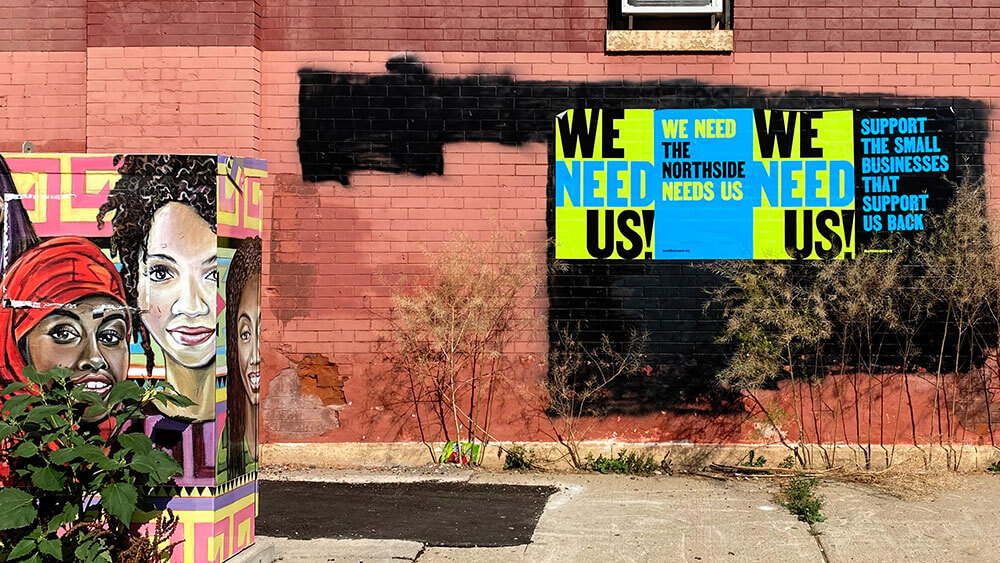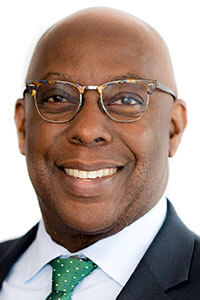
“We Need Us!” campaign posters adorned buildings, billboards, and windows in seven Minneapolis neighborhoods. Meet Minneapolis designed the campaign to rally the community’s support for local Minneapolis businesses.
On top of dealing with the pandemic, Minneapolis suffered the additional trauma of being the city where George Floyd was murdered by a police officer. Globally, the shared experience of witnessing Floyd’s death via video during a time when much of the world was in lockdown sparked a widespread movement toward racial justice and equity. Inside Meet Minneapolis, the pandemic and Floyd’s killing helped create what Melvin Tennant, CAE, the DMO’s president and CEO, called “an accelerated evolution” of strategies and policies designed to support employees and the community.

Melvin Tennant
In May 2020, soon after Floyd’s death, Tennant held a Zoom staff meeting where every team member was given the opportunity to talk about their experience, and since then, Meet Minneapolis leadership has continued to ask staff how they are feeling, he said. The organization had a wellness committee in place before the pandemic, but it became more hands-on and responsive to staff feedback, Tennant added. “We’ve done a lot of surveys over the last couple of years of the team to check on how people are doing and how they think things are going. Over the last two years, we certainly have been through a number of challenges, but it has made us a lot stronger and much more galvanized as a team,” Tennant told Convene. “I believe that it’s mainly because we have involved the team in most of the major decisions that involve our operation — whether it’s how we return to work, what sort of initiatives are included in our work plan, and the way in which we position the city.”
Like a lot of organizations, Meet Minneapolis has added some additional benefits over the last couple of years, Tennant said, including allowing staff to carry over vacation because of the uncertainty of travel during the pandemic. And as staff began this spring to come back to work in person on a hybrid schedule, the organization’s policy is to remain flexible.
“The pandemic has made it harder for people to compartmentalize their lives,” Tennant said. “You look at Zoom meetings and a child may run up, or a pet may come into the picture, or you’ll hear workers in the background doing some sort of repair on someone’s home. … We’ve grown to be much more understanding and compassionate about the ways that people live their lives holistically. So now that we’re beginning to come back to work, we still need to respect the fact that those boundaries have been blurred.”
The organization currently has a hybrid work environment with 60 percent of time spent in person at the office and 40 percent remote, “but there really is no policing of it,” Tennant said. “It’s allowing people to be as flexible as they need to be, but it’s understanding that we have to welcome the whole person to work.”
Meet Minneapolis had always encouraged staff to give of themselves as they see fit, Tennant said, but an organic movement by staff to find ways to volunteer in South Minneapolis, where Floyd died, has led to a formal policy of community-related volunteer work. Staff are given up to 40 hours a year of paid time off to participate in community-related projects and a community-service component now is included in performance evaluations, he added. The policy “makes sure that we have a direct, tangible connection with the community we are charged with representing. It would be very easy for us to do it at arm’s length, but this really gives us those connections to the community.”
Community engagement is also behind the work Meet Minneapolis is doing in partnership with seven cultural districts, communicating the diversity and history of the residents who live there and promoting the richness of experiences available to visitors in those areas. The districts include Franklin Avenue East, a corridor filled with Native American galleries and public art and historically a gathering place for the city’s indigenous population, and 38th Street, which includes George Floyd Square. “Those are areas that really help fully tell the story of Minneapolis and further reinforce the fact that we’re moving toward ways of telling our story [in terms of ] who we are versus what we have — who are we as a city versus what are our assets.”
The changes made to staff policies aren’t rocket science, Tennant said. “It’s simply a matter of keeping the lines of communication open and encouraging people to bring their whole selves to work.” In 2021, Meet Minneapolis retained almost 90 percent of its staff, he added. “That tells me people want to work here and I’m very happy about that. And that sort of defies what we’ve heard about the Great Resignation — at least in our little corner of the world.”
Barbara Palmer is deputy editor at Convene.
